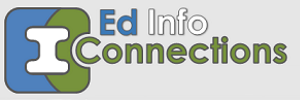Washington Post reporter joins the discussion Rick Hess recently opined on about the achievement gap and whether gifted and talented students should be shortchanged in favor of the closing the achievement gap. Mathews rightly points out some fundamental differences between education and business and that we make different types of decisions in these contexts. Mathews also suggests that some of Hess’ argument belongs to another era in that in this age we need to meet the needs of all children.
Read more ›
What Does the Increase in the Federal Digital Footprint Mean in a Post-NCLB World?
As bolts are being taken out of the structure of NCLB, one area I have been thinking about is how over the last decade the Federal government has been expanding its role in the area of digital technology. What does this mean in a post-NCLB world? Read more ›
How can we make online educational content findable and usable?
How can we make online educational content findable and usable? Albert Einstein famously said that “everything should be made as simple as possible, but not simpler.” Read more ›
Open Tests….is he CRAZY?
In a recent post in EducationNext, Eric Hanushek of the Hoover Institution asked why not have open tests? An open test would mean publishing online and in advance items that might be on an accountability test. IS HE CRAZY? This goes against all of the standard accepted protocols for test administration, protocols that require strict security over the tests in advance to prevent teachers drilling students on the questions they will receive thereby compromising the tests’ validity as instruments to independently assess student knowledge. Read more ›
Data Analysis in the Digital Ocean
My last post introduced the idea of the Digital Ocean. We have reached a point where we can digitally gather information from student activities while they learn, rather than use more artificial measures given at separate times to make inferences about students. Read more ›
Assessment in the Digital Ocean
There continues to be ongoing discussion about valid and appropriate assessment of student learning (for example see here) and its use in school accountability (see here as part of the NCLB waivers discussion ). Most of this debate focuses on traditional views of assessment as decontextualized tasks delivered outside of the regular classroom process. This is differentiated from the more formative assessment done by teachers and parents that involves observations of performance in the context of daily learning activities. Read more ›
How Can Infrastructures Affect Teachers & Systemic Improvement?
A recent discussion between David K. Cohen of the University of Michigan and the Fordham Institute’s Chris Tessone used the term infrastructure. Cohen, in an earlier post on ShankarBlog (from the American Federation of Teachers’ Shankar Institute), argued that individual reforms such as the DCPS IMPACT teacher performance review system were insufficient to fix the system overall. Read more ›
Are All Teacher-Student Linkages Created Equal?
Across the nation educators and their technologists have been working to implement what is a seemingly simple information systems enhancement: linking the records for teachers with the records for students. This should seem to involve a matt of linking two different computer applications; a matter for programmers over a weekend. Linking teacher and student records should seem to be a matter for a couple of computer programmers on the weekend. Nothing could be further from the truth.
Read more ›
What is the Relationship Between Ed Schools, Research, and Practice?
Many in the blogosphere are having a good time with a statement made by Bill Gates that education schools are “not about research”. Clearly, there are some that are, including some that the Bill and Melinda Gates Foundation has generously funded. In fairness, two points come to mind: Read more ›
